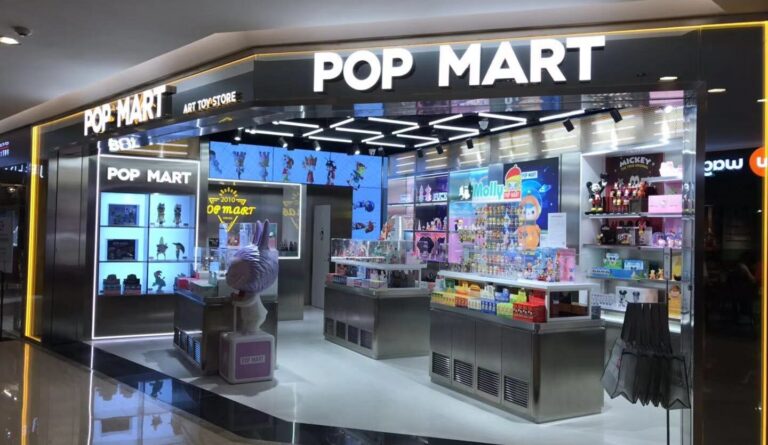In recent years, the blind box economy in China has benefited from the vigorous development of the two-dimensional culture, and its market scale has grown rapidly. Blind boxes are a product of popular consumer culture.
Who are blind box consumers in China
The MOB research institute estimates that blind box economy in China will reach 30 billion Yuan in 2024.The competition in the blind box market is very fierce, and the market structure has not been stabilized. Although POP mart is temporarily leading, it only accounts for 8.5% of the market share.
In terms of consumers, female white-collar workers in first tier cities and generation Z college students are the main force of the blind box market in China. They have an above average purchasing power and are ready to pay between 60 RMB to hundreds for a blind box. Females accounted for 62.6% of the blind box consumers. From the perspective of occupation classification, professional white-collar workers accounted for 49.7%, and students accounted for 28.6%.
In terms of age, 18-24 year olds accounted for 37.6% of blind box consumption in China, while those aged 25-34 accounted for 37.3%.
New trend of travel blind boxes in China
The blind box market in China is mainly represented by the blind toy boxes. However, recently a new trend of blind box has risen: “Destination unknown”. It is a blind box where a destination is chosen randomly. The buyer will be given a plane ticket to one of 200 airports200 airports are covered for the price of 98 Yuan ($15). This new trend has attracted a lot of attention on social media. For example, the Tiktok blind box campaign attracted more than 10 million users on April 3rd 2021 alone, and 100 million users on XiaoHongShu (RED) on the same day.
Travel blind boxes in China are targeted to young consumers that enjoy the thrill of not knowing where the final destination.
How do travel blind boxes work?
Tickets are purchased through an online platform such as ly.com or Tongcheng Travel, in which passengers provide their travel information, select a departure airport and then pay 98 yuan. If the randomly chosen date and destination are unsuitable, users may ask for a refund, but once they confirm their choice there is no going back.

Source: Sina.com, A blind box airline ticket resulted in a trip to Fenghuang Ariport in Tongren city, Guizhou province
During the Qingming Festival between April 4th and 6th 2021, 20 million users tried tried to book a blind box trip on the on-line platform Tongcheng Travel causing the APP to crash. One month later, a similar occurrence happened for the five day May Labour Holiday.
Although, travel blind boxes in China are quite popular, there has been some criticism. Some customers say that the value of the tickets is higher than the usual price. An expert in Tourism states that “It will not include popular airlines and the marketing campaign may also be aimed at the fast sale of some tickets from less popular airlines that were originally not that expensive.” Adding to inconvenient departure times that may ultimately force a customer to give up on the trip.
How blind boxes in China use hunger marketing
Hunger marketing is a promotional strategy in which there is a limited quantity or limited time offer on the product to create an illusion of excess demand. Scarcity can casts a luxury feeling on the products and hence adding additional value to products.
The trend of blind boxes in China is an example of hunger marketing, brands divide their products into different categories of rarity, they set a barrier, expressing the idea that not everyone can get the most special boxes and therefore generate a sense of competition. Hunger marketing pushes blind box consumers to make emotional decisions.
Another important point of hunger marketing is the use of social media such as Douyin 抖音, XiaoHongshu 小红书 and Weibo 微博 to create buzz and hot topics Through extensive campaigns on social media brands can attract young adults whose consumption desires are closely linked to what is happening online.
The Blind box market in China: Infinite possibilities
There is no limit to the blind box economy in China, from toys, water bottles, to hotels. Everything could be made into a blind box. However, there is a limit to consumers tolerance.
One example of blind boxes gone wrong was blind box pets, where users ordered a pet of an unknown sort to be shipped up to 1,700 kilometes to their home. Due to animal cruelty and the spread of diseases, the pet blind-box business caused tremendous backlash online from netizens calling for a boycott. The operation resulted in 160 puppies and kittens being seized from a warehouse in Chengdu, at the time, four animals were already dead and many more were infected with viruses.
The blind box economy in China takeaways
- Generally speaking, China’s blind box industry is in the early stage of development, with the characteristics of fast growth, large growth space and young people as the consumer group.
- Travel blind boxes are a recent trend that attracted millions of customers during important holidays in China
- Blind boxes in China are an example of hunger marketing where brands create buzz on social medias and cater the emotional desires of young consumers.
- However, the industry is discovering where the moral lines can be drawn. Blind boxes may be one way to distribute undesirable products that otherwise would have gone unsold to unknowing consumers, such as cheap overnight airline tickets. Bling boxes may not always be the best for consumers, not to mention, the obvious ethical implications of doing a blind box business model to sell living things like pets.
Learn something new? Stay updated on the Chinese market by following our WeChat, scan the QR code below, or subscribe to our newsletter

Listen to over 100 China entrepreneur stories on China Paradigms, the China business podcast
Listen to China Paradigm on Apple Podcast






